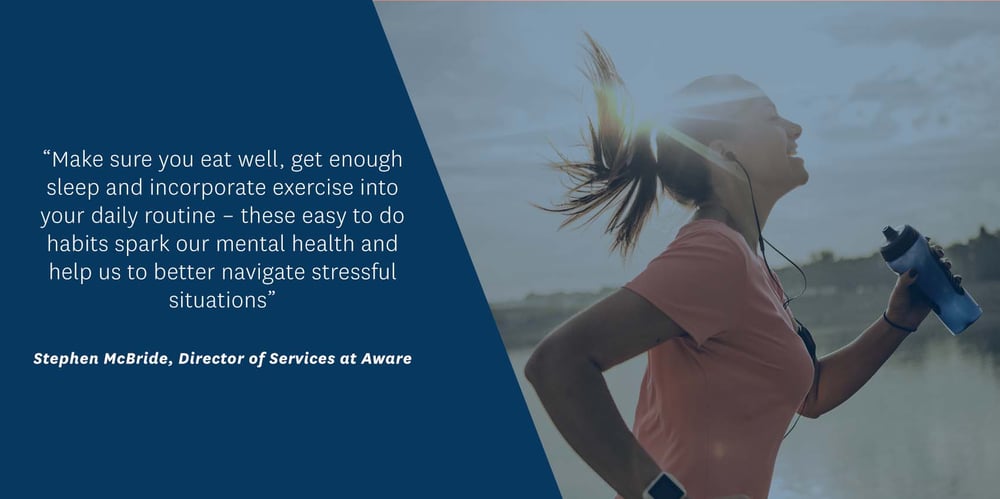These past 18 months have tested almost everyone’s mental well-being. Mental health issues are on the rise, with people who may never have experienced anxiety or a mood related disorder in the past now finding themselves struggling to cope. We spoke with two mental health experts (both working with Aware) to find out how to practically address these issues and how to build mental resilience.

When we take a step back and we look at how our lives were turned upside down literally overnight and the magnitude of the stress of the situation, we can see that there were many elements to the pandemic that were extreme in terms of their ability to induce anxiety. There was the very real worry around catching Covid and the potential impact on our health, for many people they worried about losing their job or making ends meet, there was the isolation from family and friends and not to mention the loss of our identities.
We are now however in a position where thankfully almost 90% of the population is vaccinated and
restrictions on movement are easing. Many businesses are bringing their employees back to the office - and so it would seem plausible to think that everyone might be looking forward to this return to normality. However it’s not that simple and the effects and the impact of this past almost two years have had a profound impact on many people’s confidence and sense of self. There is much trepidation and nervousness amongst many about a return to normal life and how to handle social situations as well as the work environment. In many ways, the words of Dr Faccui ring true when he said that “coronavirus will be imprinted on the personality of our nation for a very long time.”

Aware, the national organisation providing free support, education and information services to those impacted by anxiety, depression, bipolar disorder and related mood conditions, has noticed an increase in the number of people needing support as we move out of the pandemic. Stephen McBride, Director of Services at Aware believes that if the pandemic has taught us anything it’s that we are all vulnerable – however he also believes that when we acknowledge this vulnerability we do in fact build resilience.
Stephen says, “Re-emerging into the world will be challenging at varying degrees for different people.
We all have our own individual responses to what is going on around us. It is important to normalise these responses and to validate our feelings about them. It is also important not to put undue pressure on yourself if you are feeling cautious, uncertain or anxious. The antidote to some of this fear, that can help foster resilience, is to move away from avoiding your feelings. Find the space internally to speak about how you are and avoid chastising yourself – acknowledging your feelings while also calming your inner critic can be hugely impactful.”
Stephen believes small and slow incremental steps should be adopted by those who are feeling nervous and remembering that we all have choices – taking ownership and exercising our decision making abilities will not only help us to manage our anxiety around social and work situations but it will also help us to feel more empowered and confident.

Stephen added, “Putting some focus on what it is that we can control is beneficial, taking ownership and remembering that we can exercise choices. Importantly we must also consider our thinking patterns; not engaging in ‘what if’ scenarios is helpful for building and maintaining resilience. Seek to think ‘in the now’ and slow down your thinking instead of jumping ahead towards the future.”
Dr. Claire Hayes, Consultant Clinical Psychologist and Clinical Director of Aware echoes Stephen’s sentiment. She has developed a practical, three-stepped approach to explain the core principles of cognitive behavioural therapy (CBT) to help people understand and manage their anxiety. Claire has called this the ‘Coping Triangle’ and it is a simple and effective tool to acknowledge our feelings – it encourages people to firstly become aware of their thoughts, then challenge their beliefs and lastly focus specifically on helpful actions they can implement. Claire also encourages people to follow the late Susan Jeffers’ call to ‘feel the fear and do it anyway, adding in the importance of us doing so with compassion.
Claire says, “Some people may prefer to wait to return to the office until they feel more confident, but this can backfire. As soon as we think of whatever triggers us to feel anxious, we may feel anxious, and this can make us feel awful – some people even experience a sick sensation in their stomach. Others notice themselves blushing. Others may have thoughts racing.

Deliberately breathing slowly while thinking a helpful thought such as ‘I choose to breathe slowly’, can be a great way to manage anxiety by distracting from other thoughts such as ‘I can’t’, or ‘people are wondering what is wrong with me.”
Stephen also mentions some of what he calls “the bread and butter” of wellness tactics and how incorporating them into your life can radically improve anxiety levels – he says, “Look after your nutrition and make sure you eat well, get enough sleep and incorporate exercise into your daily routine – these easy to do habits spark our mental health and help us to better navigate stressful situations.”
Lastly, Claire encourages us all to see anxiety as a normal part of life. It is a protective mechanism but can be activated by our thoughts as well as any external danger. Claire adds “We have all come through so much in the past eighteen months and while not minimising how difficult it has been for many people, we have also learned that we are more resilient than we may have thought.”
If you are concerned about your mood or the mood of a loved one, Aware has a broad range of free services for people impacted by depression, bipolar disorder and related mood conditions. These include Support & Self Care Groups, a Support Line and Support Mail service, along with a range of positive mental health programmes. Aware is also a mental health partner for The Insurance Charities and provides a host of other informational resources.
Aware are currently running a Life Skills Programme which is designed to help people learn more about how we think and how this can influence our actions in helpful or unhelpful ways. Find out more at www.aware.ie.



